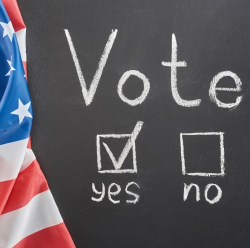How Social Issues Influenced Voting by Young Americans
 The research team I lead at Cause and Social Influence tracks the behaviors and motivations of young Americans (ages 18-30) with respect to social issues and movements. And while plenty of issues have drawn the attention of young Americans in 2020 — not least COVID-19 — our latest research finds that one issue In particular drove young Americans to vote in the recent U.S. presidential election: racial equity for Black Americans and people of color.
The research team I lead at Cause and Social Influence tracks the behaviors and motivations of young Americans (ages 18-30) with respect to social issues and movements. And while plenty of issues have drawn the attention of young Americans in 2020 — not least COVID-19 — our latest research finds that one issue In particular drove young Americans to vote in the recent U.S. presidential election: racial equity for Black Americans and people of color.
We surveyed young Americans in October and then again on November 4, the day after the election. Our results — published in two waves, Influencing Young Americans to Act — 2020 Election Research Reports, Wave 1 and Wave 2 — reveal that a consistent, overriding concern about racial inequality, discrimination, and social justice, particularly though not exclusively as it impacts Black Americans, was a key factor in young Americans’ decision to vote and choice of presidential candidate.
Based on our sample, here are a couple of things we learned about young Americans’ participation in the 2020 presidential election:
1. Young Americans voted for a candidate, not against one. In our first wave of election research in October, the vast majority of survey respondents had already settled on their candidate, with 64 percent saying they planned to vote for Joe Biden and 28 percent planning to vote for Donald Trump. When asked to give a reason for their choice, 58 percent said they liked and supported their chosen candidate’s stance on issues important to them, while 25 percent said they neither liked nor supported the other candidate’s stance on issues important to them. In other words, a majority of young Americans responding to our survey said that support for, rather than opposition to, a candidate and his positions was a key motivating factor in their choice of candidate.
By the time Election Day (November 3) rolled around, nearly two-thirds (60 percent) of young Americans had already voted or planned to vote for Biden for president, while about a quarter (28 percent) had already voted or planned to vote for Donald Trump.
2. Racial equity was a key factor in the way young Americans voted. When asked in October to name the specific issues or causes driving their choice of candidate, 60 percent of respondents said Black Lives Matter (i.e., racial inequity, discrimination, and injustice related to Black Americans), while 39 percent mentioned civil rights/racial discrimination/social injustice related to groups other than Black Americans.
Respondents’ reasons for supporting a candidate remained more or less unchanged for those who voted on November 3, with our second wave survey finding that nearly two-thirds (59 percent) of all respondents said the biggest factor in their choice of candidate was Black Lives Matter (racial inequity, discrimination, and injustice related to Black Americans), while 42 percent mentioned civil rights/racial discrimination/social injustice related to groups other than Black Americans.
The other top issues cited as reasons to back a certain candidate were COVID-19 (44 percent), the budget and economy (43 percent), and healthcare reform (38 percent).
3. Young Americans trust social movements and local government the most. Given the proliferation of false and misleading information in the months leading up to the 2020 election — New York Times‘ reporters tracked 1.1 million election-related “falsehoods” in September and October alone — we asked young Americans how much they trusted specific individuals and entities to do what was right to ensure a fair election. Social movements (65 percent) and local government (65 percent) scored highest, followed by Joe Biden (58 percent) and nonprofit organizations (5 percent).
The list of “I do not trust them at all” responses among our sample was topped by Donald Trump (42 percent), followed by Republican members of Congress (30 percent), Speaker of the House Nancy Pelosi (27 percent), corporations (26 percent), and Senate Majority Leader Mitch McConnell (25 percent).
Bright Spots
During what surely was one of the most divisive elections in my lifetime, one response stood out for me and actually made me hopeful. About half of our sample said their voting experience was good because, “I had a voice in the 2020 presidential election. I think my vote matters this year.” Another hopeful response: 64 percent said the results of the election won’t affect their charitable giving plans.
Our research underscores the importance of social issues to young Americans — something we will talk more about in the coming weeks. At the same time, the high levels of activity and engagement surrounding the election speak directly to the opportunity nonprofits and for-profit companies have to promote greater civic engagement and participation among young Americans through the causes they themselves support. If anyone is looking for reasons to be hopeful as we try to get a handle on the coronavirus and keep ourselves and our families safe over the next few months, that seems like a good place to start.
Happy Thanksgiving, everyone!






